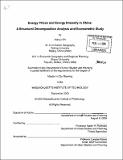| dc.contributor.advisor | Karen R. Polenske. | en_US |
| dc.contributor.author | Shi, Xiaoyu, M.C.P. Massachusetts Institute of Technology | en_US |
| dc.contributor.other | Massachusetts Institute of Technology. Dept. of Urban Studies and Planning. | en_US |
| dc.coverage.spatial | a-cc--- | en_US |
| dc.date.accessioned | 2006-09-28T15:14:48Z | |
| dc.date.available | 2006-09-28T15:14:48Z | |
| dc.date.copyright | 2005 | en_US |
| dc.date.issued | 2005 | en_US |
| dc.identifier.uri | http://hdl.handle.net/1721.1/34173 | |
| dc.description | Thesis (M.C.P.)--Massachusetts Institute of Technology, Dept. of Urban Studies and Planning, 2005. | en_US |
| dc.description | Includes bibliographical references (p. 113-115). | en_US |
| dc.description.abstract | Since the start of its economic reforms in 1978, China's energy prices relative to other prices have increased. At the same time, its energy intensity, i.e., physical energy consumption per unit of Gross Domestic Product (GDP), has declined dramatically, by about 70%, in spite of increases in energy consumption. Is this just a coincidence? Or does a systematic relationship exist between energy prices and energy intensity? In this study, I examine whether and how China's energy price changes affect its energy intensity trend during 1980-2002 at a macro level. I conduct the research using two complementary economic models (the input-output-based structural decomposition analysis and econometric regression models) and a decomposition method of own-price elasticity of energy intensity. Findings include a negative own-price elasticity of energy intensity, a price-inducement effect on energy-efficiency improvement, and a greater sensitivity, in terms of the reaction of energy intensity towards changes in energy prices, of the industry sector, compared to the overall economy. Analysts can use these results as a starting point for China's energy use and carbon emission forecasts, which they traditionally conduct in China without accounting for energy intensity and energy prices. | en_US |
| dc.description.abstract | (cont.) In addition, policy implications may initiate new thinking about energy policies that are needed to conserve China's energy resources and reduce carbon emissions. | en_US |
| dc.description.statementofresponsibility | by Xiaoyu Shi. | en_US |
| dc.format.extent | 115 p. | en_US |
| dc.format.extent | 5995651 bytes | |
| dc.format.extent | 6000435 bytes | |
| dc.format.mimetype | application/pdf | |
| dc.format.mimetype | application/pdf | |
| dc.language.iso | eng | en_US |
| dc.publisher | Massachusetts Institute of Technology | en_US |
| dc.rights | M.I.T. theses are protected by copyright. They may be viewed from this source for any purpose, but reproduction or distribution in any format is prohibited without written permission. See provided URL for inquiries about permission. | en_US |
| dc.rights.uri | http://dspace.mit.edu/handle/1721.1/7582 | |
| dc.subject | Urban Studies and Planning. | en_US |
| dc.title | Energy prices and energy intensity in China : a structural decomposition analysis and econometric study | en_US |
| dc.type | Thesis | en_US |
| dc.description.degree | M.C.P. | en_US |
| dc.contributor.department | Massachusetts Institute of Technology. Department of Urban Studies and Planning | |
| dc.identifier.oclc | 69135581 | en_US |
